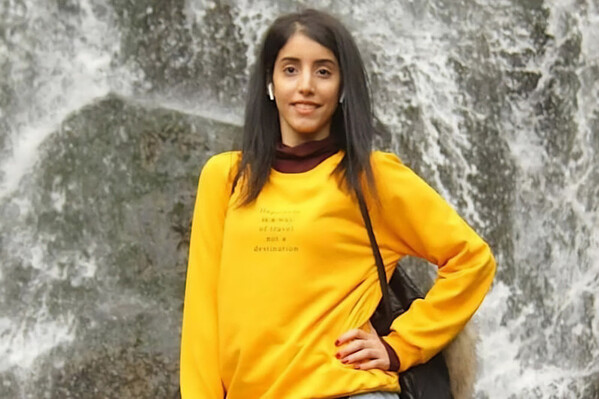On August 21, 2025, Saudi Arabia’s Specialized Criminal Court of Appeal resentenced fitness influencer and women’s rights activist Manahel al-Otaibi to five years in prison, followed by a five-year travel ban. She has been held since November 16, 2022.
Earlier, on January 9, 2024, the same court sentenced her to 11 years in prison for so-called “terrorist offences” in a secret trial. This new decision reduces her sentence, but it means she will still spend two more years in prison after already enduring nearly three years of arbitrary detention.
Manahel was first accused of violating the Anti-Cyber Crime Law. Authorities later added charges under the counter-terrorism law, targeting her for posting tweets in support of women’s rights and sharing photos of herself at a mall without an abaya (a traditional long-sleeved robe) on Snapchat.
During her imprisonment, she has faced torture, ill-treatment, and enforced disappearance. Manahel al-Otaibi must be released immediately and unconditionally.
Here’s what you can do:
Write to the Saudi Minister of Justice urging him to:
- Order the immediate and unconditional release of Manahel al-Otaibi, as she has been convicted solely for exercising her right to freedom of expression.
- Ensure that, pending her release, she has immediate access to necessary medical care.
- Conduct an impartial investigation into her allegations of torture and other ill-treatment.
Write to:
Walid bin Mohammad AlSama’ani
Ministry of Justice
Postal Code 11472,
P.O. Box 7775
Riyadh, Saudi Arabia
Email: 1950@moj.gov.sa
X: @MojKsa
Salutation: Your Excellency,
And copy:
Her Excellency Amal Yahya Almoalimi
Ambassador
Royal Embassy of Saudi Arabia
201 Sussex Drive
Ottawa, ON K1N 1K6
Tel: (613) 237-4100 Fax: (613) 237-0567
Email: caemb@mofa.gov.sa
Charges based on peaceful expression
Manahel al-Otaibi’s case was first heard by the Criminal Court in Riyadh. The charges against her came from her social media posts that “opposed regulations and laws that relate to women,” including the call to #EndMaleGuardianship.
Court documents reviewed by Amnesty International show that she was accused of “publishing and spreading content that contains committing public sins and inciting individuals and girls in society to renounce religious principles and social values and to violate public order and public morals” on her Twitter account.
These accusations were framed as violations of the Anti-Cybercrime Law. On January 23, 2023, the Criminal Court ruled that it did not have jurisdiction and referred the case to the Specialized Criminal Court (SCC).

Misuse of Counter-Terror Laws
The SCC often uses vague provisions in the anti-cybercrime and counter-terrorism laws to treat peaceful expression as “terrorism.” Amnesty International has shown that every stage of the SCC’s judicial process is marked by serious human rights violations.
Since 2018, Saudi authorities have arbitrarily detained women’s rights activists who campaigned against the male guardianship system and for the right to drive.
Many reported sexual harassment, torture, and other forms of abuse during interrogation. Those who were released remain under travel bans and continue to face restrictions on their freedom of expression.
Torture, disappearance, and ill-treatment
Manahel al-Otaibi was forcibly disappeared twice. From November 5, 2023, to April 2024, she was held without contact. On April 14, 2024, she called her family and revealed she was in solitary confinement in al-Malaz Prison with a broken leg after a beating, and she was denied medical care. Later, from December 15, 2024, to March 15, 2025, she was again subjected to enforced disappearance.
In September 2024, after a month in incommunicado detention, she was briefly allowed to contact her family. She reported being held in solitary confinement for a month, beaten by guards and prisoners, and forced to clean toilets. Her family believes she was permitted the call only so she could tell them to stop speaking publicly about her imprisonment.
Wider pattern of repression
Manahel lives with multiple sclerosis, a condition her family said began after she witnessed the arrest of her older sister, Mariam al-Otaibi. Mariam, also a women’s rights activist, was detained for 104 days in 2017 and remains under a travel ban and restrictions on her expression.
Another sister, Fawzia al-Otaibi, was also targeted for her activism. In the same case against Manahel, prosecutors accused Fawzia of leading a “propaganda campaign” urging women to reject religious and social norms, and sought her arrest. Fearing detention, Fawzia fled the country in 2022.
Manahel’s case is not isolated. In January 2023, the SCC resentenced Salma al-Shehab, a Saudi PhD student at Leeds University, to 27 years in prison and a 27-year travel ban for tweets supporting women’s rights. Her sentence was later reduced to four years in prison, with an additional four suspended, and she was released in February 2025.
Amnesty International has documented at least 86 cases since 2013 where people were prosecuted simply for exercising their rights to freedom of expression, association, and peaceful assembly. Those targeted include human rights defenders, political activists, journalists, poets, and clerics. At least 40 of these cases were linked to social media posts. The real number is likely much higher.
Please take action as soon as possible until February 25, 2026. The UA will be duly updated should there be the need for further action.



























